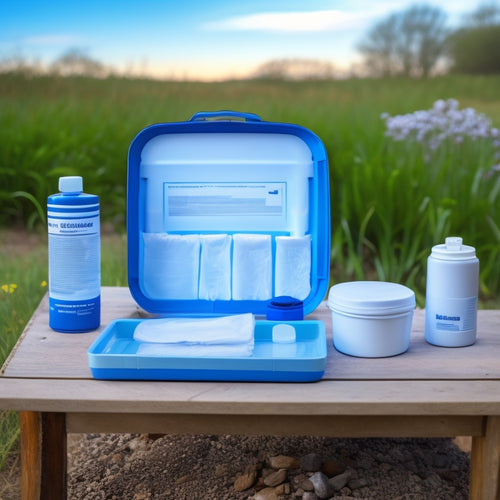
FDA Urges Food Safety Measures Amid Outbreaks
Share
The FDA issues timely alerts and updates in response to food safety outbreaks, emphasizing the need for consumers to stay informed. Staying up-to-date on the latest recalls and practicing proper food handling techniques, such as washing hands and utensils frequently, can reduce the risk of foodborne illnesses. Consumers can take proactive measures by following evidence-based guidelines, cooking food to proper temperatures, and storing perishable foods at safe temperatures. By understanding the risks associated with various foods and taking preventive measures, consumers can minimize exposure to harmful pathogens. Further guidance on safe food handling practices can help mitigate the risk of contamination.
Key Takeaways
• Stay informed about food safety updates and recalls on cdc.gov to reduce the risk of foodborne illnesses.
• Practice proper cooking using a food thermometer to kill bacteria and prevent contamination.
• Wash hands frequently with soap and warm water for at least 20 seconds to prevent cross-contamination.
• Separate raw meats from ready-to-eat foods to avoid cross-contamination and maintain good hand hygiene.
• Store perishable foods in the refrigerator at 40°F (4°C) or below to prevent bacterial growth.
Food Safety Alerts and Updates
The FDA continues to closely monitor and respond to various food safety alerts and outbreaks, including recent instances of Avian Flu, Salmonella contamination linked to fresh basil, and E. coli contamination linked to organic walnuts. These outbreaks underscore the importance of staying informed about food safety updates and taking proactive measures to prevent foodborne illness.
To stay ahead of the curve, it is crucial to regularly check the latest recalls on cdc.gov and follow proper handling practices, such as washing hands, utensils, and surfaces frequently. By doing so, consumers can greatly reduce their risk of falling victim to foodborne illnesses.
Stay tuned for the latest food safety updates and tips on preventing foodborne illnesses.
Preventing Foodborne Illnesses
Foodborne illness prevention requires a multifaceted approach that involves understanding the risks associated with various foods and following evidence-based guidelines to minimize exposure to harmful pathogens.
To prevent foodborne illnesses, it is essential to:
-
Practice proper cooking by using a food thermometer to verify that food is cooked to the correct internal temperature.
-
Maintain good hand hygiene by washing hands frequently, especially before and after handling food.
-
Avoid cross-contamination by separating raw meats from ready-to-eat foods.
-
Keep surfaces and utensils clean and sanitized.
-
Stay informed about food safety alerts and updates to stay ahead of potential risks.
Safe Food Handling Practices
Handling and storing food safely is crucial to preventing the contamination and proliferation of harmful pathogens that can cause foodborne illnesses.
Proper handwashing techniques are essential, as they can prevent cross-contamination. Wash your hands with soap and warm water for at least 20 seconds, especially after handling raw meat, poultry, and seafood.
When cooking, make sure you reach proper cooking temperatures to kill bacteria. Use a food thermometer to guarantee your dishes are cooked to a safe internal temperature.
Finally, store perishable foods in the refrigerator at a temperature of 40°F (4°C) or below to prevent bacterial growth.
Frequently Asked Questions
Can I Get Sick From Eating Food That's Past Its Expiration Date?
"Eating food past its expiration date can lead to food poisoning, as shelf life is a critical factor in maintaining food safety. Always check expiration dates and handle food properly to minimize the risk of illness."
How Often Should I Clean My Refrigerator and Freezer?
'A clean fridge is a happy fridge!' To maintain peak Fridge Organization and Appliance Maintenance, clean your refrigerator and freezer every 1-2 months, checking expiration dates and wiping down surfaces to prevent bacterial growth and foodborne illnesses.
Are Foodborne Illnesses More Common in Certain Seasons?
Foodborne illnesses can peak during holiday gatherings and summer months when warm temperatures and humidity create ideal conditions for bacterial growth, while climate changes may also impact food safety, emphasizing the need for vigilant food handling practices.
Can I Reuse Marinades or Sauces After Cooking?
When reusing marinades or sauces after cooking, beware of cross contamination risks. Instead, reserve a portion before cooking to preserve the original flavor profile, ensuring a safe and savory repeat performance.
Are All Foodborne Illnesses Caused by Bacteria?
Not all foodborne illnesses are caused by bacteria; viral pathogens, such as norovirus, and parasitic infections, like Giardiasis, can also be culprits, underscoring the significance of thorough food safety measures to prevent a range of pathogens.
Related Posts
-

Boost Productivity With Free Google Sheets Templates
You can enhance your productivity exponentially by utilizing free Google Sheets templates, which offer a proven way t...
-

Emergency Sanitation Essentials for Your Needs
In emergency situations, access to proper sanitation facilities is essential for maintaining personal hygiene, preven...
-

LYNK PROFESSIONAL: Transform Your Under-Sink Storage
Transform your under-sink storage with LYNK PROFESSIONAL, a cleverly designed system that tackles common challenges. ...


